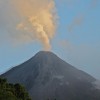
Natural disasters refer to environmental phenomenon that are destructive and occur naturally. Natural disasters include floods, volcanic activity, hurricanes, droughts, and earthquakes. While some of these disasters can be predicted and prepared for, they cannot be completely avoided and may result in damage. Some disasters can be so devastating that it wipes out human life in some areas. Whatever the disaster may be, it affects societies both negatively and positively.
What Is A Flood?
A flood is as a large body of water in areas where it becomes destructive and impedes the natural cycle of living organisms. A flood may be the result of long periods of heavy rain, or rivers or lakes that have overflown their banks. High temperatures can also cause flooding when it causes ice caps and snow to melt quickly. Heavy floods can be so disastrous that infrastructure is washed away, people and animals drown, and people can be stranded for long periods.
Disadvantages of a Flood
The society and economy of a country suffers in many ways after a flood. The loss of lives, vegetation, and infrastructure means there will be fewer people on the labor force, less agriculture available for locals and exportation, and less businesses to contribute to the economy of the country. There will be mass dislocation of people, many of whom may be left homeless and jobless. In order to fill this gap the government will have to spend a little more. The country may seek assistance from foreign countries to supply food and materials to clean and replace infrastructure. While some countries will assist freely, some will charge for its efforts, putting the country in debt and at an economic loss.
Benefits of a Flood
There are benefits of flooding despite its immediate ill effects. For farmers and those in the agricultural sector, it helps them in the long run by providing nutrients to the soil that were lacking. This makes the soil more fertile and increases agricultural production. Nutrients are also added to rivers and lakes, improving the health of fishes that can be consumed. There may be relocation of fishes and organisms living in water bodies. This may improve the ecosystem. New predators and prey are introduced to areas, balancing the aquatic population.
Volcanoes
While there are a few benefits to floods, there are a few more for volcanoes. A volcanic eruption is the emission of hot magma, ash, and lava from a volcano. Volcanoes can result in other natural disasters such as earthquakes, tsunamis, and floods.
Benefits of Volcanoes
After a volcanic eruption, the soil becomes rich due to the nutrients from the volcano. Precious stones and gems that were once deep within the earth are brought to the earth’s surface and will contribute greatly to the economy of the country. Some valuable emissions from volcanoes are pumice, opal, gold, mercury, and metals. It also releases good chemicals into the atmosphere. Chemicals such as carbon dioxide and hydrogen that contributes to the water cycle.
Disadvantages of Volcanoes
In the event of a volcanic eruption, the people and animals in the area are threatened and they must be evacuated. The evacuation of these individuals will require the efforts of the government and social groups to see to it that the individuals receive shelter. This places a dent in the socioeconomic factors of a country as families may be separated, and buildings used as shelters will not be available for their regular use. The eruption of a volcano releases large amounts of smoke and dust that may form dust clouds. Dust clouds will restrict the amount of light available to plants and animals, resulting in less food and more lives being lost.
Hurricanes
Many lives are lost every year in the Caribbean due to hurricanes. Hurricanes are a type of cyclone that consists of heavy rain and very strong winds.
Disadvantages of Hurricanes
Hurricanes result in the destruction to infrastructure and loss of lives, vegetation, and livestock. Many hurricanes cause floods, which can wash away homes and people. The strong winds can destroy large trees and buildings, or use objects as missiles that can cause great damage. The loss of life resulting from hurricanes mean the labor force will be lessened. The destruction of vegetation and livestock means countries will have to source more of their food from other countries.
Benefits of Hurricanes The winds from a hurricane can also contribute to the agricultural sector in the long run. The wind will cause the top soil to be distributed to areas in which it was lacking.
Through the redevelopment of infrastructure, the property value and living conditions in some areas will improve.
Hurricanes help to bring people together as they help each other in the aftermath.
Lowers temperature.
It helps to build up the coastal areas of islands, making the island wider.
In all instances of natural disasters, the social and economic aspects of a country will be negatively affected. The redistribution of population will affect the country negatively as overcrowding may become an issue. It may lead to increased illnesses and social problems. Families will be separated, disrupting the socialization of many. Jobs will be lost and the economy will take a hit. Countries will receive loans from various international institutions. This money should not only be used to repair damages caused by the disaster, it should also be invested in something that can produce great returns.
, The Benefits/Advantages and Disadvantages of Some Natural Disasters (Floods, Volcanoes, and Hurricanes) www.ozeldersin.com bitirme tezi,ödev,proje dönem ödevi
